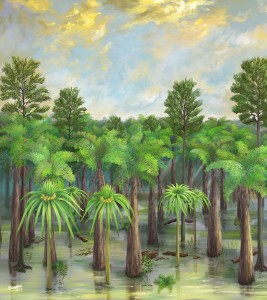The Wuda flora: an earliest Permian tropical forest ecosystem preserved under volcanic ash
17 February
Monday 17 February (Indoor Meeting): 'The Wuda flora: an earliest Permian tropical forest ecosystem preserved under volcanic ash'. Speaker: Professor Jason Hilton (University of Birmingham).
 This talk will showcase an exceptional fossil flora preserved in exquisite detail under a blanket of volcanic ash at Wuda in Inner Mongolia (north China). Think of it as Pompeii without the Romans, but rather than stepping back in time a few thousand years in Mediterranean Italy, jump back 299 million years to the earliest Permian and a tropical forest ecosystem. The visually stunning fossils are preserved complete, in their life positions, and with exceptional preservation that records their morphology and, in some cases, cellular anatomy. So far more than 50,000 specimens have been identified and their distributions mapped from over 12,000 1x1 meter quadrats, recording the entire forest ecosystem. Detailed and time-consuming work continues to document new plant species, genera, and families, and interpreting their evolutionary and ecological significance. This remarkable fossil flora provides an unrivalled glimpse into the past and is revolutionising our understanding of Paleozoic peat- (and hence coal-) forming communities. It also provides key information on the persistence of wetland plants from the Carboniferous of Europe and America into the Permian of China, and the changing palaeoenvironmental conditions that led to the dramatic changes in global floral distributions through the Carboniferous-Permian transition.
This talk will showcase an exceptional fossil flora preserved in exquisite detail under a blanket of volcanic ash at Wuda in Inner Mongolia (north China). Think of it as Pompeii without the Romans, but rather than stepping back in time a few thousand years in Mediterranean Italy, jump back 299 million years to the earliest Permian and a tropical forest ecosystem. The visually stunning fossils are preserved complete, in their life positions, and with exceptional preservation that records their morphology and, in some cases, cellular anatomy. So far more than 50,000 specimens have been identified and their distributions mapped from over 12,000 1x1 meter quadrats, recording the entire forest ecosystem. Detailed and time-consuming work continues to document new plant species, genera, and families, and interpreting their evolutionary and ecological significance. This remarkable fossil flora provides an unrivalled glimpse into the past and is revolutionising our understanding of Paleozoic peat- (and hence coal-) forming communities. It also provides key information on the persistence of wetland plants from the Carboniferous of Europe and America into the Permian of China, and the changing palaeoenvironmental conditions that led to the dramatic changes in global floral distributions through the Carboniferous-Permian transition.
 Biography: Jason completed his BSc in Natural Environmental Sciences (Earth Sciences) from Sheffield University in 1992, then undertook his PhD at Cardiff University in Paleozoic palaeobotany. He worked at the National Museum of Wales (Cardiff), the Chinese Academy of Sciences Beijing), the National Museums of Scotland (Edinburgh) before joining the University of Birmingham in 2003. His primary research focus is on fossil plants, investigating origin and systematic relationships of plant groups, changes in diversity through evolutionary radiation and extinctions events, and floral responses to intervals of profound environmental and climatic change through the fossil record. He teaches a range of courses in Earth Sciences spanning introductory fieldwork, stratigraphic principles, Earth history, resource geology, and palaeobiology.
Biography: Jason completed his BSc in Natural Environmental Sciences (Earth Sciences) from Sheffield University in 1992, then undertook his PhD at Cardiff University in Paleozoic palaeobotany. He worked at the National Museum of Wales (Cardiff), the Chinese Academy of Sciences Beijing), the National Museums of Scotland (Edinburgh) before joining the University of Birmingham in 2003. His primary research focus is on fossil plants, investigating origin and systematic relationships of plant groups, changes in diversity through evolutionary radiation and extinctions events, and floral responses to intervals of profound environmental and climatic change through the fossil record. He teaches a range of courses in Earth Sciences spanning introductory fieldwork, stratigraphic principles, Earth history, resource geology, and palaeobiology.
